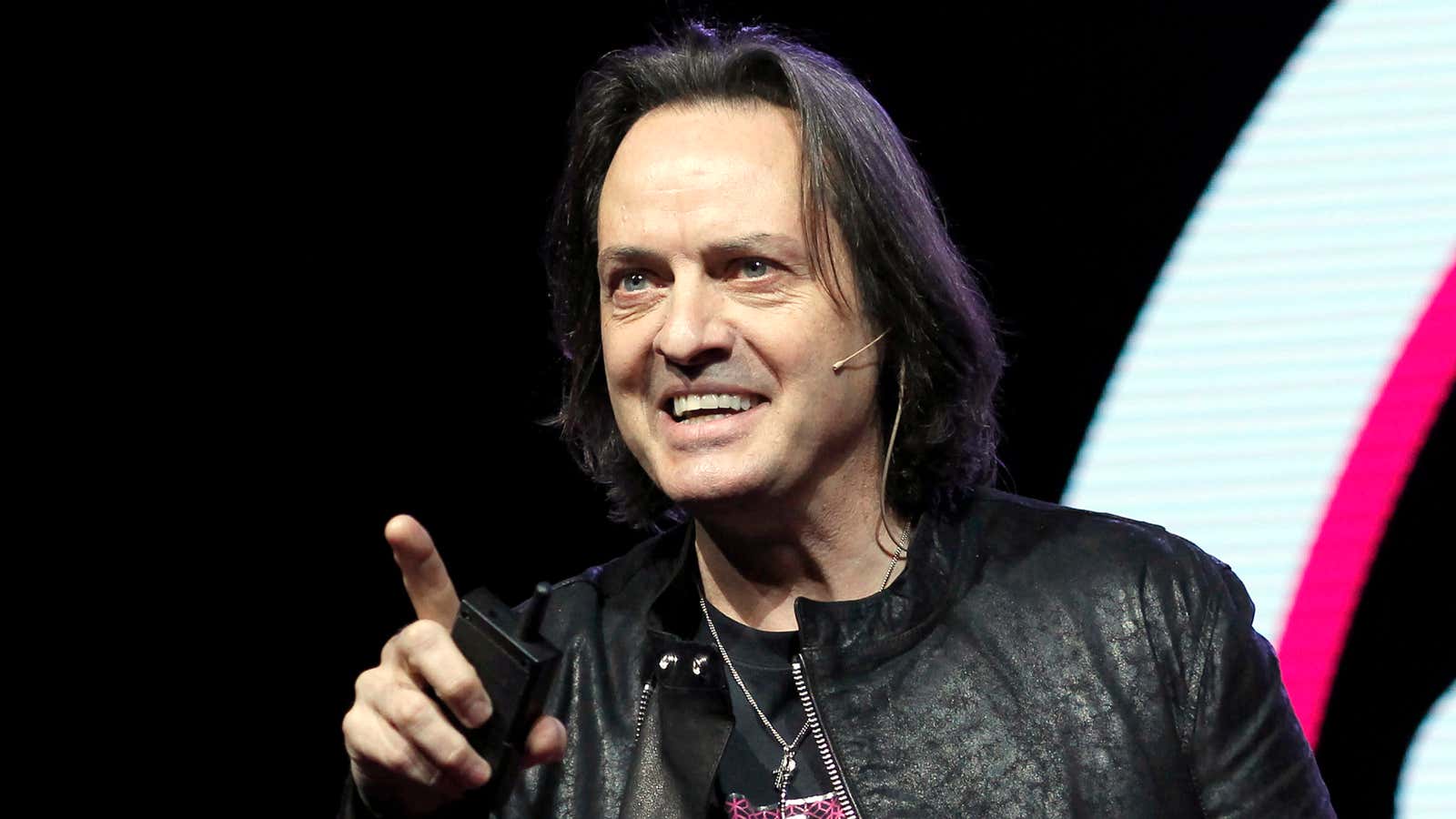In a video rant released this morning, T-Mobile CEO John Legere responded to complaints about its video service from Google and open internet advocates, calling his critics “jerks” whose critiques are “bullshit” designed to bolster their companies and confuse his customers.
The upstart mobile company launched a new program in the fall of 2015—”Binge On”—that exempts data transmitted by Netflix, Hulu, HBO, and about two dozen other participating video services from the caps on customers’ data plans—essentially lowering the cost of streaming video.
It’s a smart move for the third-largest US mobile provider, eager to attract more customers. But Binge On is right at the edge of what is permitted by the net neutrality rules the FCC enacted in 2015.
Those rules forbid blocking data, discriminating between different kinds of data, or allowing companies to pay to transmit their data faster than others, known as paid prioritization. This is to prevent internet service providers from abusing the power they have over their networks to leverage higher fees from content providers and customers alike.
The side effects of Binge On
Binge On might look to be a form of discrimination because it treats data from different video providers in different ways. But T-Mobile has so far avoided any sanction by allowing any video provider to join, and by not taking any money for the service.
Shortly after the program began, however, YouTube, which is owned by Google (which is owned by Alphabet) and is not participating in the program, complained that T-Mobile was throttling its video—slowing the speed at which consumers could download it. All video to Binge On customers is displayed at 480p resolution, effectively that of a DVD, but YouTube offers many videos at HD resolution.
T-Mobile at first told the Wall Street Journal this was a technical problem, but today (Jan. 7) Legere said it is a strategy designed to stretch consumers’ bandwidth to allow them to watch as much video as possible under their data caps with non-Binge On providers. ”We created adaptive video technology to optimize for mobile screens and stream at a bitrate designed to stretch your data (pssst, Google, that’s a GOOD thing),” he wrote in a post accompanying his video.
The uncouth un-carrier
Legere argues that the practice doesn’t count as throttling because customers can opt out of Binge On.
“There are people out there saying we’re ‘throttling,'” he says. ”That’s a game of semantics, and it’s bullshit! That’s not what we’re doing. What throttling is is slowing down data and removing customer control. Let me be clear: Binge On is neither of those things.”
That’s half incorrect, though: The Electronic Frontier Foundation, which advocates for civil liberties in the digital realm, performed tests that show T-Mobile’s technology slows down video data across the board, and does not optimize it in any recognizable way. That seems to be directly in violation of the FCC’s prohibition on impairing legitimate traffic, and tests rules that would suggest the practice is unfair to YouTube and to T-Mobile customers who want to get full service on the T-Mobile network.
“The Commission staff is working to make sure it understands the new offering,” an FCC spokesperson told Quartz.
The EFF argues in a post detailing the test results that the simplest way forward for T-Mobile is to make Binge On an opt-in program instead of an opt-out one, and to clearly disclose to Binge On customers that all their video streams, not just those that don’t count against their data caps, will be slowed down. But even that would leave customers to choose between more expensive video data, or cheaper video data at lower quality. “If T-Mobile truly wants to be neutral, then all throttled videos should be exempt from customer data caps,” the EFF’s Jeremy Gillula writes.
